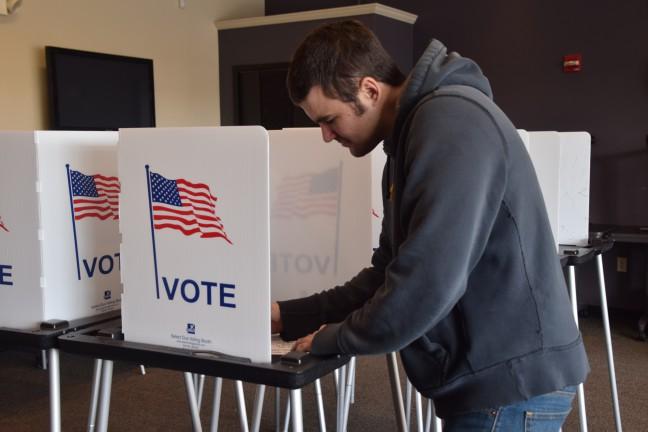In light of the University of Wisconsin’s decision to participate in the Big Ten Voting Challenge, the Associated Students of Madison, in conjunction with the Vote Everywhere campaign, met with Chancellor Rebecca Blank to discuss issues related to student voting rights.
The Big Ten Voting Challenge is an initiative encouraging the mobilization of registration of voters and voter turnout in the 2018 election, according to a statement from UW.
Student leaders from ASM and Vote Everywhere met with Blank to discuss the accessibility and ease of student voting on campus in light of this announcement, especially as this relates for out-of-state students.
William Welsh, ASM Vice Chair, said he went into the meeting hoping Blank would work with students to make voting on campus easier and more accessible.
“We were hoping that the Chancellor would express a commitment to engaging as many students as possible through voter registration,” Welsh said.
Under current law, those who wish to vote must present a Wisconsin driver’s license or other form of valid photo identification in order to vote.
Laurel Noack, the Vote Everywhere Ambassador at the Morgridge Public Service Center, said this law suppresses voting rights and civic participation, particularly among out-of-state students who don’t possess a Wisconsin driver’s license.
Welsh, an out-of-state student, said voting ID laws have created problems for students who wish to vote.
“This is another unnecessary hurdle for students to take in a time where we should be making it easier, not harder, for people to engage in their government,” Welsh said.
With regards to student identification cards, current law stipulates that student IDs which expire more than two years after their issue date are considered invalid for voting purposes.
UW student identification cards, also known as Wiscards, currently expire five years after they are first issued, which means UW students cannot present Wiscards as valid identification when they go to vote.
At the meeting, Noack proposed changing the expiration date of UW student identification cards from five years to two, so students who wish to vote can use their Wiscards as a valid form of photo identification.
According to Noack, Blank said there are no plans in the near future to change policy regarding the Wiscard expiration date.
“It’s unfortunate that the UW system fails to accommodate student needs toward this law, but I’m excited for the opportunity to protest and petition against these voting ID laws,” Noack said.
Also discussed at the meeting was the accessibility of voter identification printing stations, which students can use to print a valid voter identification card before an election.
Noack said there aren’t enough voter identification card printing stations, and said the few which do exist, such as the Union South location, are too far for many students to get to.
Through her involvement with Vote Everywhere, Noack hopes to create more printing stations which are easily accessible for the student population at-large.
“The problem is that we don’t have enough voting ID printing stations,” Noack said. “Union South is really inaccessible to some students, so we’d like to set up a voting ID printing center at the Student Activity Center or Memorial Union.”
As the 2018 election approaches, Welsh said ASM will be hosting Voter-Palooza in late October or early November, an event in which ASM will walk students through the voting registration process.
Expanding beyond campus, Noack said Vote Everywhere is currently undergoing a process of grading every state senator and representative based on their support for voting rights of out-of-state students.
The constituents of those representatives or senators who earn a C or lower, Noack said, will be encouraged by Vote Everywhere to call their representatives and advocate on behalf of out-of-state student voting rights.
“I think it’s in the best interest of our state to keep democracy open to all, and anyone should be able to vote as easy and accessibly as possible,” Noack said.


